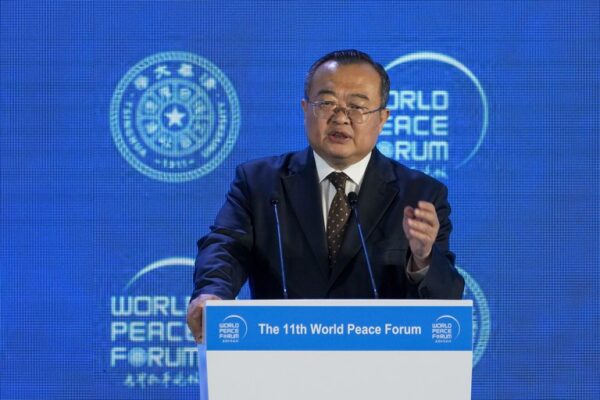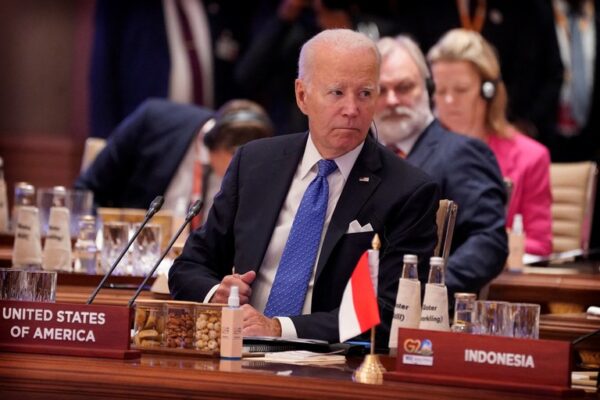
Vietnam wants it all in balancing its ties with the US and China
President Joe Biden is heading to Vietnam for a visit that will upgrade bilateral relations to a “strategic comprehensive partnership,” a symbolic step that opens the door to wider cooperation between former Cold War foes who are now grappling with an assertive, powerful China. The elevated status is a symbolic gesture that recognizes the developed state of U.S.-Vietnam ties, almost 30 years after they normalized diplomatic relations and a half century since the end of the Vietnam War. But it doesn’t reflect a fundamental change in Vietnamese policy. Indeed, it should be seen as a manifestation of what Hanoi calls its omnidirectional and independent foreign policy. The overall growth of the relationship will remain hemmed in by the fact that the communist leaders who run Vietnam share the same world view as those who control China. In a partnership hierarchy created by the Vietnamese government, at the very top are neighbors Laos and Cambodia. However, what was once Vietnam’s secure western flank is now a source of concern with China’s surge in influence through investment, lending, development projects, and corruption. Comprehensive strategic partnerships had been reserved for Vietnam’s friends since the days of the revolution: Russia, China, and India. In 2023, in recognition of their burgeoning economic relationship, Vietnam elevated South Korea to that pantheon, recently followed by Singapore and Australia, and soon Indonesia. Liu Jianchao [shown], the head of the Communist Party of China’s International Liaison Department, recently met with General Secretary of Communist Party of Vietnam, Nguyen Phu Trong. Credit: Andy Wong/AP file photo For the U.S., the leapfrog from Vietnam’s comprehensive partner to a comprehensive strategic partner is important for three reasons. First, for top leaders in Hanoi, symbolism does matter. That a former foe is now on a par with revolutionary era friends is a win. Second, this upgrade will not please China, even though Hanoi has worked assiduously to try to convince Beijing that it is maintaining its independent foreign policy. It is inconceivable that Hanoi has not briefed Beijing on this, and Communist Party of Vietnam General Secretary Nguyen Phu Trong has made party-to-party ties stronger than ever. He would not have approved the relationship upgrade if he felt insecure by Beijing’s reaction. Five days before Biden’s expected arrival this weekend, Liu Jianchao, the head of the Chinese Communist Party’s International Liaison Department met with Trong, who no doubt gave him further assurances. While Washington may want to rankle Beijing, which has overplayed its hand in the region with its aggressive South China Sea behavior and hawkish “Wolf Warrior” diplomacy, its real goal is to see Vietnam be strong enough to assert its vaunted autonomous foreign policy. Hanoi will no doubt be sending a politburo-level delegation to assure Beijing that the upgrade is not a lurch towards the United States or in any way anti-Chinese, but a manifestation of Vietnam’s independent and omni-directional foreign policy. Third, at the bureaucratic level, it’s hoped that the upgrade gives political top cover for the line ministries to increase their cooperation with U.S. counterparts across a range of issues, from countering narcotics and human trafficking to security cooperation. The upgrade does not automatically lead to more market access, more trade and investment, more port visits and other military engagements, but it won’t hurt their prospects either. In short, this upgrade is long overdue, and reflects the fact that the U.S. has far deeper ties than many other states ranked above it. An economic imperative The upgrade comes as Vietnam’s economy is slowing dramatically. Despite 8.5% growth in 2022, GDP only grew by 3.72% in the first six months of 2023, half the target. The Asian Development Bank and IMF have lowered their annual forecasts to 5.8% and 4.7%, respectively. While Vietnam has benefitted from corporate supply chain diversification out of China, that trend has also made the economy over-dependent on exports, which have fallen for five consecutive months, the longest slump in 14 years. In July, exports fell 3.5%. Industrial production contracted 1.8% in the first half of 2023, causing a 13% year-on-year increase in industrial layoffs. While Vietnam enjoys a large trade surplus with the U.S. – $44.3 billion in the first seven months of 2023 – that is down 24% year-on-year. Vietnam runs enormous trade deficits with China, as its manufactured goods are highly dependent on imported Chinese components. Without its exports to the U.S., Vietnam would run chronic trade deficits. As a direct foreign investor, the U.S. lags behind South Korea, Singapore, China, and Japan. In early 2023, Boeing announced a production facility, while Apple shifted an iPad production line out of China to Vietnam. But there’s plenty of room for growth. We should also not lose sight of portfolio investment from the U.S., where one fund alone has invested $1.5 billion in six projects. An employee works at Heesung Electronics Vietnam factory in Hai Phong, Vietnam, Aug. 29, 2023. Vietnam’s economy is slowing, with GDP growth of only 3.72% in the first six months of 2023. Credit: Nhac Nguyen/AFP Corporate Vietnam is trying to make a splash in the U.S.. Electric vehicle maker VinFast broke ground on a $4 billion plant in North Carolina, and has seen wild stock valuations after its recent listing on NASDAQ. VinFast sees the United States as the key to its growth, if not viability, despite a rocky first nine months that saw few sales and a recall. The tech firm VNG, Vietnam’s first “unicorn,” has filed paperwork for its listing on NASDAQ. If Vietnam is to escape the middle-income trap, it’s through trade and investment ties with the U.S., not China. To that end, executives from a swath of U.S. semiconductor and other tech industry will be joining Biden’s trip. What remains missing in U.S. policy towards the Asia-Pacific is an economic architecture. Since the withdrawal from the Trans-Pacific Partnership in January 2017, the United States has abdicated its leadership. States are going along with the Indo-Pacific Economic Framework for Prosperity (IPEF) , but only to keep Washington…



